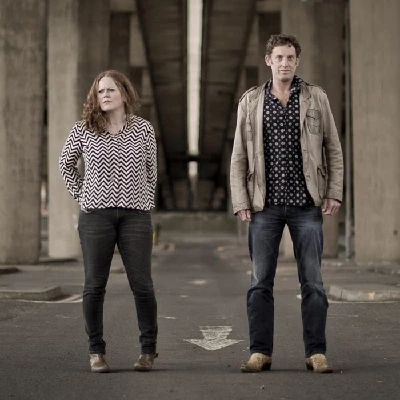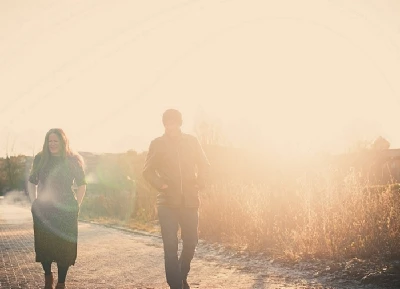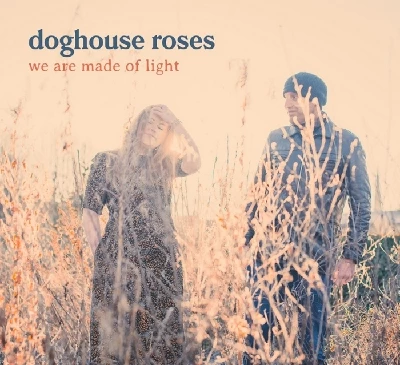published: 23 /
2 /
2020

Malcolm Carter talks to Paul Tasker, the guitarist with Glasgow-based Americana/folk duo Doghouse Roses about their fourth album, ‘We Are Made of Light’.
Article
‘We Are Made of Light’, the fourth album from Glaswegian duo Doghouse Roses, was released late last year, and for those who have been listening to the beautiful music Paul Tasker and Iona Macdonald have been making together for some fifteen years now initial thoughts were surely that this collection of songs must rank as the best album yet from the duo.
The album is a mixture of new tracks and older songs that the duo has written during their fifteen-year career but which had not been previously recorded. ‘We Are Made of Light’ is roughly split between songs which feature just Tasker and Macdonald on vocals, guitars and banjo, while the remainder introduce Neil Allan on drums and strings from the Pumpkinfield Trio which expands on the sound that fans have come to expect from Doghouse Roses.
We reviewed the album at the end of 2019 and once again would like to highlight that, even by the duo’s usual high standards, two of their best songs feature on the album. Macdonald’s ‘First of April’ places the listener in the centre of the tragedy which happened in 2009 when a helicopter crashed off the coast of Aberdeen with the loss of eighteen lives. The vocal performance from Macdonald coupled with the outstanding guitar playing is breathtaking. On a lighter note, ‘Elegy for a Seaside Town’ is another outstanding cut; Tasker’s banjo takes centre stage while Macdonald reminisces about one of those coastal towns that were such a large part of our childhood and which have all but disappeared. Those two songs alone are worth the price of the album.
Hearing such powerful new music from Macdonald and Tasker again prompted us to invade Paul Tasker’s space once more to put a few questions to him about the latest album and what had happened to his solo album planned a couple of years ago. We would like to thank Paul for his time in answering the questions.
PB: ‘We Are Made of Light’ isn’t entirely new songs as some were written some years ago. Did you feel the time was right to record and release them now?
PAUL TASKER: Some of the older songs we had actually recorded multiple times before like ‘Years’ and ‘April the 1st’, but we never felt we got the heart of the song. We also recorded both of these songs more than once for this album too…not just different takes but slightly different arrangements in different keys. Of the other older songs, we recorded a few different arrangements of ‘Arsenic’ with different keys, with and without drums and even one version where I’m lead vocal. Sometimes it takes us a while to ‘find’ a song and it was nice to come back to these old songs and finally manage to make them work.
There was also a couple of songs that didn’t make it onto the album as we felt they just didn’t fit properly. We’ll almost certainly re-record them in the future for another project.
PB: You recorded the songs directly after playing them live during your 2018 tours. Did honing them this way alter the original conception of the songs greatly?
PT: I’m not sure it altered the concept of any of the songs but it certainly tightened them up. We really rehearsed these songs a lot before taking them on tour, then we would go to the studio, perform them as if playing live and try and capture that feel. I think that approach worked well for most songs but there are a couple I would probably try and record a different way for another time…all lessons learned really!
PB: Some of the songs on ‘We Are Made of Light’ expand on the sound we’ve come to expect from Doghouse Roses; the introduction of strings. What inspired this move?
PT: Our original thought for the album was to have it just as we would play live so two guitars, or guitar and banjo and voices. We recorded most of the songs this way at the start then realised some of them were asking for more textures. As we were going for a very ‘organic’ feel, we felt bass and drums were the way to go but after we re-recorded with those there was still something missing. In the past, we’ve got around this by layering guitars or vocals but this time we wanted to do something different. We’ve known and wanted to work with Pete Harvey of the Pumpkinfield trio for a long time, and having strings on a record was something we’d wanted to try for a long time. Pete did a fantastic job with the recording and arrangement as did Harriet, Kate and Rik with the playing. We would definitely like to play with these guys again in the future.
PB: What do you feel the introduction of strings has brought to the Doghouse Roses sound?
PT: As well as a different sound and colour, I think it’s brought a new angle to this record compared to previous ones. Now we’ve done this once I hope we can start to write a bit with strings in mind and see what comes up
PB: On the upcoming dates you have promoting the album, will they feature the string players (The Pumpkinfield Trio) or will they be just the duo of Doghouse Roses on stage?
PT: Just the duo on this tour, but I hope we can do a gig with string, bass and drums sometime soon. We were hoping to do that for our album launch but Neil Allan who played drums on the album moved to France last summer, and as we really wanted to include him in the band we decided to go with the duo…it’s definitely one for the future
PB: ‘We Are Made of Light’ features a split of songs written separately by yourself and Iona as usual but there’s a surprising interpretation of Peter Green’s ‘Oh Well (Part 1)’. Why this particular song?
PT: I’d written ‘The Fermi Paradox’ but felt it needed something at the end. I was trying out different banjo ideas and came up with a little riff which I recorded, and when I played it back I thought it sounded a bit like ‘Oh Well so tried out the song and found it fell right under my fingers on the banjo. Iona really found a new way to interpret the vocal and we were really pleased with how it came out.
PB: The song flows so smoothly from your original ‘The Fermi Paradox’ (a highlight on the album) that it’s not until Iona sings those familiar opening lyrics that the listener realises that the song has change. Did you have the segue planned when you finished writing ‘The Fermi Paradox’ or was it something that you thought might work in the studio?
PT: There was a rough plan for that section but nothing more. We recorded banjo, drums and vocals live, so during that section Neil on drums and myself were just keeping an eye on each other for the dynamics and trying not to kick too hard into the’ Oh Well’ riff.
PB: Your banjo playing on ‘The Fermi Paradox’ is exceptional; as a multi-instrumentalist do you have a favourite instrument which you enjoy playing more than the others?
PT: Thank you very much. I really enjoy playing the banjo particularly clawhammer style which I learned the fundamentals of in the 90s from a great banjo player called Ray Stewart in Aberdeen. I would still say I’m a guitarist first and foremost, though I’m trying to write more on the banjo.
PB: Given the success of ‘Oh Well’ are there any other non-original songs that you’d like to give the Doghouse Roses treatment to? Do you perform any live?
PT: We really enjoy a cover version and have recorded a version of ’16 Tons’ by Tennessie Ernie Ford and ‘Both Sides of the Tweed’ by Dick Gaughan on EPs in the past. Live we’ve always included covers in our set. Currently covers include a banjo led arrangement of ‘Wish You Were Here’ by Pink Floyd, a fingerstyle guitar version of ‘Solsbury Hill’, a song called ‘ Take Me out Drinking Tonight’ by the great Dundonian singer-songwriter Michael Marra, and ‘Elegy for Johnny Cash’ by the fantastic Jackie Leven.
PB: Iona’s vocals are so hauntingly beautiful that, for those who have never seen Doghouse Roses live, there’s a slight feeling that maybe the studio, producer or surroundings help bring out those qualities that make Iona’s vocals so special but noting that this latest album was recorded at a different studio with different people it’s obviously down to the fact that she is a naturally exceptional singer; working so closely with her how would you describe her vocals?
PT: Iona could sing the phone book and bring a tear to your eye.
PB: Not being in the UK one of my biggest disappointments of 2019 was not being able to make the Jackie Leven tribute gig, Leventime, which Doghouse Roses performed at. What are your thoughts about that night now?
PT: It was a lovely night and we were very honuored to be involved. It was organized by ‘Sounds I the Suburbs’ promotions and had a first half featuring five performers playing twosongs each; a cover of a Jackie Leven song and one of their own. The second half featured Jackie’s partner Deborah Greenwood and her band followed by an encore featuring everybody on the stage. There was a very warm atmosphere in the room and some great interpretations of Jackie’s songs which shows the regard that people hold for Jackie the man and his music
PB: You featured on BBC4 fairly recently in a piece about the Glasgow Music scene. For those of us who missed that too can you tell us a little about that and how it came about?
PB: It was kind of strange how that came about. I got a call one day from the producer who found me through my guitar teaching website asking if I’d be interested in being involved in the programme. It was a short series looking at the influences involved in various music scenes in the UK; ska in Coventry, punk in London and the country connection in Glasgow to name a few. The dates that were originally planned for filming were in early March 2018 and I couldn’t make it but filming was held up by ‘The Beast From the East’ so I got to do it after all, and I also got to meet Kim Appleby.
PB: Apart from the UK and a few other European countries you seem to gig quite a lot in Germany. Do you have a large following there? Do you feel that some European countries relate to and appreciate the take on folk music Doghouse Roses and similar bands create more openly than your home country?
PT: I’m not sure really. I think to build an audience anywhere you need to try and find the people that might enjoy what your doing or hope that they find you. This can be done by playing live in the right places, getting radio play on the right shows plus all the online music discovery options which I’m forever trying to get my head around.
For a band like us, I think the live show is very important and it may be that we’ve had more opportunity in getting to play to people in Germany that are coming from the same place musically that we are. It’s a really great thing getting to play in other places too…there’s a certain sense of freedom that comes with that.
PB: When you last kindly answered some questions for us you mentioned that you were working on a follow-up to your solo instrumental album, ‘Cold Weather Music’. Is there any news on that?
PT: It’s always in the pipeline! I actually recorded a follow up with Slovenian engineer / producer Dejan Lapanja in 2017, but, as is usual, I’ve changed little bits here and there and now would like to re-record bits of it at some point. I hope I’ll get a chance to do that later this year as last year really got taken up with the Doghouse Roses album and tour.
PB: Thank you.
Band Links:-
http://doghouseroses.net/
https://www.facebook.com/doghouseroses
https://twitter.com/doghouseroses
Picture Gallery:-

